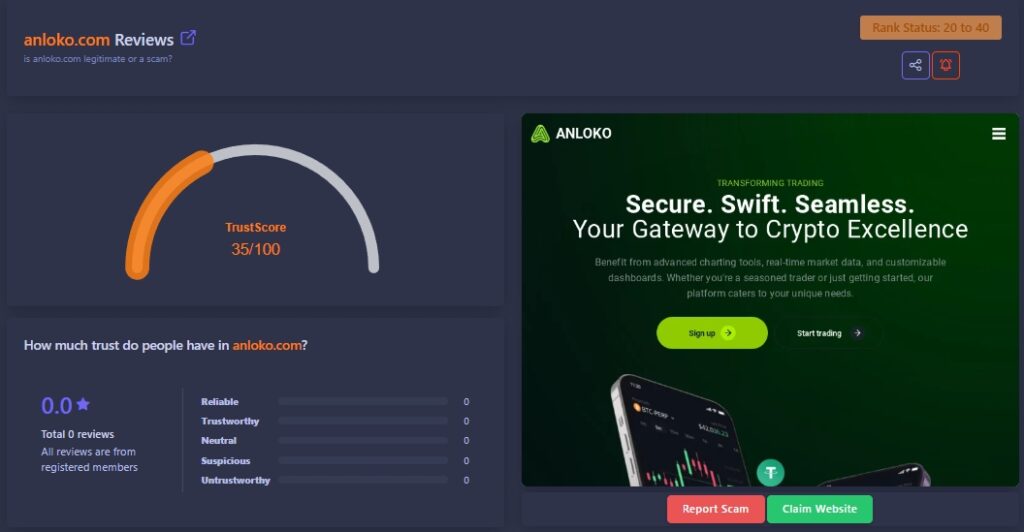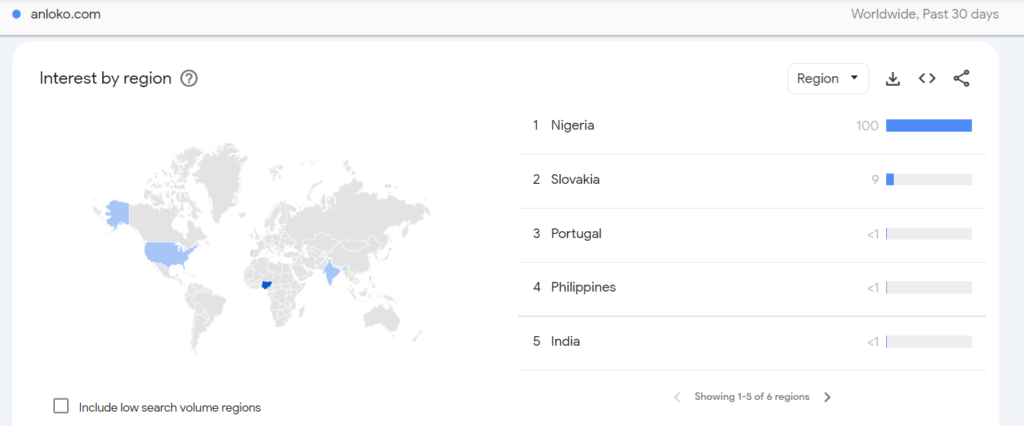Anloko Exchange Review: Classical Crypto Scam Platform

Anloko[.]com is a new crypto platform that has recently gained attentions through aggressive marketing Tactics. The platform claims users can earn free Bitcoin simply by signing up and entering a voucher code. According to Anloko’s advertisements, celebrities like Cristiano Ronaldo, Elon Musk, Bill Gates, Mark Zuckerberg, and Warren Buffet have all vouched for the platform. But this is Scamminder, let’s see what’s really going on with them.
Remember, our website gives you access to an powerful AI tool. Use this advanced technology to deeply research cryptocurrency projects, coins, exchanges, and anything else you find online. The next time you’re exploring the wild world of crypto and want to take extra steps of care, count on us to provide you with the information you may need before doing anything wrong :).
Additionally, you can check the latest results of our AI analysis on Anloko here.
https://scamminder.com/websites/anloko.com

Anloko’s website and YouTube ads showcase supposed testimonials from these high-profile public figures and celebrities, Commending the ease of earning free crypto on the site. The marketing materials FOMO ( Fear of missing out) people to quickly sign up and take advantage of this opportunity.

Anloko Exchange appears to be a revolutionary new platform where anyone can effortlessly earn free Bitcoin. However, as we’ll explore throughout this article, there is more to Anloko than meets the eye.

Anloko’s Advertising Strategy
The main advertising strategy for Anloko is by creating deepfake videos of celebrities endorsing the platform. They use advanced techniques to manipulate videos of famous figures like Cristiano Ronaldo, Elon Musk, Bill Gates, Mark Zuckerberg, and Warren Buffett.

In these videos, it looks like the celebrities are talking directly to the viewer and raving about how Anloko allowed them to make massive profits through crypto trading, or how they are willing to donate to people from their net worth by giving them free btc. Of course, these Speeches and videos are completely forged and fake. The deepfake technology just splices the celebrity footage together with a script promoting Anloko.
For the average viewer, the deepfake videos appear very realistic and clear and convincing. The quality of the video manipulation has improved surprisingly fast in recent years, making it difficult to detect fake videos from real ones. Anloko exploits this to try and manipulate viewers into trusting the platform based on what seem to be credible celebrity endorsements.

Anloko’s Signup Process
One of the major red flags with Anloko is their signup process. To even get started on the platform, users are required to make an initial deposit of 0.005 BTC (around $150 at the time) just to activate withdrawals.
This is very unusual, as most legitimate crypto trading platforms do not require an upfront deposit simply to withdraw funds. The deposit is framed as necessary to “activate” the ability to take money out, but in reality it appears to be a method to hook users into depositing their funds.
By mandating an expensive upfront deposit before granting basic withdrawal privileges, Anloko makes it very difficult for users to back out even if they have second thoughts or suspicions about the platform. Once the 0.005 BTC is deposited, users are psychologically invested in the platform and unlikely to walk away before “getting their money’s worth”.
Overall, the forced deposit requirement is a major red flag indicating users’ funds are at risk on Anloko’s platform. Legitimate crypto trading sites do not demand such high fees just for withdrawal access. This sneaky tactic allows Anloko to secure substantial upfront deposits from users under the guise of “activation”, when in reality withdrawal is likely impossible.
Advance Fee Scam
An advance-fee scam is a form of fraud that involves promising the victim a significant share of a large sum of money in return for a small up-front payment. The scammers claim this up-front payment will be used to obtain the large sum being offered.
However, after the victim makes the initial payment, the fraudsters either invent a series of additional fees that need to be paid or simply disappear without providing anything they promised.
The advance-fee scam works by exploiting the victim’s greed and willingness to take a risk for a big potential payoff. Even though paying a fee upfront seems suspicious, the promise of a large reward is enough to convince many victims to take a chance.
Scammers rely on creating an urgent, time-limited offer to pressure victims into wiring money right away before carefully thinking it through. They make up reasons why the fee is required, such as taxes, lawyer fees, or processing costs.
Victims continue sending more money, assuming that each fee will be the last one needed before they get the big payout. But there is never any reward at the end. The scammers keep inventing new fees until the victim either runs out of money or realizes they have been scammed.
This type of fraud has been around for centuries and still fools new victims every day. It is one of the most prevalent and lucrative forms of confidence tricks used by scammers and con artists worldwide.

Investigation into Anloko
Further investigation of Anloko’s website and operations reveals some telling details. The site itself is hastily put together, with stock images and generic text. There’s no page with company information or leadership profiles.
Overall, these findings confirm that Anloko is not actually operating as a cryptocurrency exchange, and has all the hallmarks of a scam designed to steal users’ deposits. The website and operations appear hastily put together to lure in victims with promises of free Bitcoin.
Anloko’s Prevalence
Anloko appears to be targeting victims mainly in Nigeria. Analysis of Google Trends data for the search term “Anloko” shows the highest number of searches coming from Nigeria, with the term barely registering any search volume in other countries.

This suggests Anloko is aggressively promoting itself using online ads and social media specifically aimed at Nigerian internet users. Scammers frequently target countries where there is less awareness of crypto scams, and weaker consumer protection laws. Nigeria likely appears an attractive market to Anloko due to the rapid adoption of cryptocurrency in the country, paired with many economically disadvantaged citizens eager to believe promises of easy money.
Other Platforms
Anloko is not the only platform using this type of scam. After further investigation, we identified several other websites that appear to be running the same or very similar scams:
- Bitsowex[.]com** – This site uses an identical layout and process as Anloko. Users are promised free Bitcoin after signing up and entering a promo code.
- Bitxspark[.]com** – Very similar to Anloko and Bitsowex. Uses fake celebrity endorsements and requires an initial deposit before withdrawals are allowed.
- Nevofex[.]com** – Follows the Anloko model closely. Fake testimonials and videos try to convince users to sign up and deposit funds.
- Tokenely[.]com** – Uses the same scam tactics as the above sites. Promises free crypto but requires payment first before any withdrawals.
- Xbirex[.]com** – Identical scam to Anloko with same promo codes and deposit requirements before withdrawing funds.
- Dovamp[.]com** – Another Anloko clone promising free Bitcoin if users sign up and enter voucher codes after making a deposit.
- Ogonto[.]com** – Similar layout, process, fake celebrity endorsements and deposit requirements as Anloko and the other platforms listed above.
It’s clear these sites are all following the same scam playbook as Anloko. Users should be extremely wary of any platform promising free or easy money in exchange for an initial deposit. These are advance fee scams designed to steal funds from unsuspecting victims.

Warning Signs
When evaluating any investment opportunity, it’s important to watch out for certain red flags that may indicate a scam. Anloko exhibited several of these warning signs:
**Too Good to Be True**
Anloko’s promise of free Bitcoin simply for signing up was clearly too good to be true. Any offer of guaranteed returns or free money with no risk should be met with skepticism. Legitimate investments require some risk and effort to generate returns.
**Lack of Regulation**
Anloko appeared to be operating in a legal gray area with no oversight. Unregulated firms can easily defraud customers without consequences. Investors should stick to reputable platforms and assets with clear regulatory status.
**Pressure to Act Quickly**
Scammers often create a false sense of urgency to get victims to act impulsively. Anloko used fake celebrity endorsements to generate hype and get users to sign up right away before deeply examining the platform. High-pressure sales tactics are a glaring red flag.
**Lack of Transparency**
Anloko provided very little information about who was behind the platform or how user funds would be handled and invested. The opacity made it impossible to perform proper due diligence. Legitimate firms are transparent.
By recognizing these types of warning signs early, investors can avoid the pain of being scammed. Caution and critical thinking are the best defenses.
Lessons Learned
As my experience with Anloko demonstrated, it’s crucial to approach any new online investment opportunity with a healthy dose of skepticism and thorough research. A few key lessons:
– If an investment promises guaranteed, risk-free returns that sound too good to be true, they almost certainly are. Any legitimate platform should be upfront about the risks involved.
– Take claims of celebrity endorsements with a massive grain of salt, as deepfake technology makes it easy to fabricate endorsements. Verify endorsements through official channels.
– Research the company, founders, and reviews thoroughly before sending any money. Look for red flags like a lack of online history, zero transparency, or reports of users unable to withdraw funds.
– Don’t let FOMO (fear of missing out) rush you into an investment without doing your homework first. Scammers exploit the hype around new technologies.
– Trust your instincts. If something feels off, don’t ignore that feeling. It’s better to miss a dubious “opportunity” than lose money in a scam.
By taking a measured approach, doing our research, and listening to our inner skeptic, we can make wise investment decisions and sidestep the scammers looking to profit off our excitement about the future of finance. Caution and critical thinking are our best defenses.
Conclusion
Looking back on my experience exploring Anloko Exchange, several key lessons stand out that are applicable more broadly when assessing the legitimacy of online investment opportunities.
First and foremost, any promises of easy money or guaranteed returns should be viewed with intense skepticism, as these are typical warning signs of scams. The old adage “if it’s too good to be true, it probably is” rings especially true in the cryptocurrency space.
Additionally, a lack of transparency around an organization’s operations, leadership team, and registration details should raise red flags. Legitimate companies have nothing to hide when it comes to basic background information.
Perhaps most importantly, any time you are pressured to send money first before receiving a payout, you are likely caught in an advance fee scam. Reputable platforms never require upfront fees in exchange for promised profits.
In closing, always listen to your gut instinct when assessing investment opportunities you come across online. If something feels off or rushed, take a step back and do your research before sending any money. While scams will always exist in the digital asset world, we can protect ourselves by remaining vigilant and skeptical.




